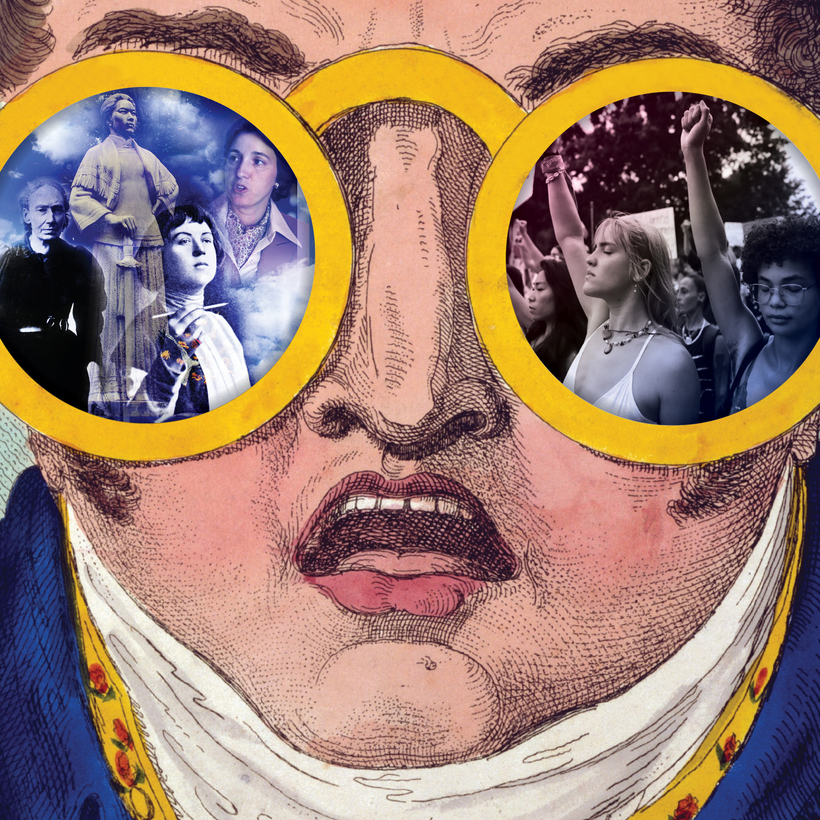Make no mistake: the five Supreme Court justices who voted to overturn Roe v. Wade unleashed a radical attack on women and the U.S. Constitution. It was the sort of attack that can only be met with a radical response, if our liberties are to survive. It will in all likelihood produce a response never seen in modern feminist history.
The dissenting opinion put it starkly: “[The Court] says that from the moment of fertilization a woman has no rights to speak of.” It also stated: “Rescinding an individual right in its entirety and conferring it on the State, an action the Court takes today for the first time in history, affects all who have relied on our constitutional system of government and its structure of individual liberties protected from state oversight.”
I thought of a piece I wrote 44 years ago for The Observer Magazine about the revolutionary feminists who were the catalysts, the triggers, the keepers of the flame—and in one case fired the first shot—in the Paris Commune of 1871, the Chinese Revolution of 1911, and the Russian Revolution of 1917.
In some ways, the things they fought for were the same things that the Supreme Court attacked last week: the liberation of women from political or religious oppression.
My list included Ch’iu Chin, executed at daybreak on July 15, 1907, aged 32, for organizing an uprising aimed at overthrowing the Manchu dynasty, in China. She had single-handedly masterminded the armed insurrection of an entire province, an extraordinary feat of organization.

Her career was all the more astonishing because she was born into a Confucian society where a woman’s role of painful and total subservience had hardly been challenged. By leaving her husband and her children, she had taken a step into the abyss more radical than anything Henrik Ibsen wrote about. Ch’iu became obsessed with the plight of Chinese women, and she railed in her writings against the customs that kept them in bondage: enforced marriage, seclusion, concubinage, foot binding.
Women, she felt, needed a revolution that would overturn the old structure of Chinese society. Scholars have called naïve her romantic belief that overthrowing the dynasty would bring swift and radical change, though her uprising and others ended it four years later and established the People’s Republic. In China, however, she is a folk hero whose status, even across the country’s cultural revolutions, has been unchallenged since her death.
In a poem written five days before her execution, after a botched coordinated uprising had led to her interrogation and torture, she warned her successors against inaction: “It pains me that my compatriots are still in their drunken sleep and that I know of no one who will save our motherland from engulfing darkness. With night falling and nowhere to go, all that people can do is shed useless and despairing tears.” It has a timely ring.
These revolutionary women were more demanding than their male counterparts—more radical, more extreme. They had to be, because they were fighting on two fronts: for political and sexual revolution. And they were on untried ground. There was no room for compromise or gray areas. Which was often the reason for their defeat.
I wrote about Alexandra Kollontai, who became Commissar for Social Welfare in the first Soviet government. A general’s daughter, an elegant dresser, and a beauty, she had become radicalized first by a governess with revolutionary connections, and later by the working conditions in a factory she visited where her husband was installing a ventilation system. “Already as a small child I criticized the injustice of adults,” she wrote. “And in early life I had eyes for the social injustices prevailing in Russia.” Like Ch’iu Chin, she abandoned her marriage, left for Zurich to study political economy, and returned to join the illegal Social-Democratic Party, formed to unite the revolutionary organizations in the Russian Empire and duly outlawed by the czar.
“With night falling and nowhere to go, all that people can do is shed useless and despairing tears.”
Kollontai had added another personal and almost impossible dimension to her struggle: the foundation of a new sexual morality. “We of the older generation would have been able to create and achieve much more had our energies not been fragmented,” she later wrote. “It was, in fact, an eternal defensive war against the interventions of the male into our ego, a struggle revolving around the problem-complex: work or marriage and love. We felt enslaved and tried to loosen the love bond. And after the recurring struggle with the beloved man we finally tore ourselves away and rushed toward freedom. Thereupon we were again alone, unhappy, lonesome, but free—to pursue our beloved, chosen ideal … work.”

Kollontai had gone into the illegal underground in St. Petersburg. In 1908, on the point of arrest for writing a pamphlet urging an armed uprising in Finland against the Russian government, she left for Europe and the U.S. and began corresponding with Lenin. When the February revolution came, she raced back to Russia, one of the first political exiles to do so. She arrived in time to meet the sealed train that had carried Lenin and some 30 comrades to the Finland Station.
By October, she was Commissar for Social Welfare. She was a gifted orator, and Lenin recognized her talents by giving her the job, immediately after her return, of addressing the sailors on the battleships at Petrograd, whom she won over, single-handedly, from the provisional Kerensky government.
It was during these chaotic years that Kollantai drafted a law legalizing abortion on social and medical grounds—partly as a way to cut down illegal abortions. An edict of November 1920 made the Soviet Union the first Western country to decriminalize the voluntary termination of a pregnancy. (Abortion was criminalized again under Stalin in 1936, then made legal again in 1955, when Maria Kovrigina, a medical doctor, became health minister and saw through the law lifting the ban. Women’s living conditions, she said, had played a decisive part in allowing it—an echo of the dissenting judges’ dire warnings last week.)
Kollontai also managed to nationalize maternity-and-infant care. According to Julius Martov, one of Lenin’s closest friends, “there are only two communists in Russia, Lenin and Madame Kollontai.” And that was the problem. She was too radical, repeatedly criticizing party leaders for becoming bureaucratic and losing touch with the proletariat. Kollontai’s views on “the new woman” and “the new morality” were bitterly attacked by orthodox Marxists.
Kollontai was sent into diplomatic exile in Norway—more than 20 years of lonely, official semi-disgrace. She turned to fiction as a means of exploring sexual relations. Her books were attacked by Party critics as “reeking of pornography and the gutter.” The opponents of her writings, she said, “tried to impose on me an absolutely false postulate that I was preaching ‘free love.’ I would put it the other way. I was always preaching to the women, make yourself free from the enslavement of love of a man.”
Kollontai’s views on “the new woman” and “the new morality” were bitterly attacked by orthodox Marxists.
But perhaps the bravest and most defiant of these women came from the Paris Commune of 1871. Louise Michel has been called variously “the Grand Druidess of Anarchy,” “the Revolutionary Breath of the Commune,” and “the Red Virgin.” She first shot at her own countrymen in the Place de l’Hôtel-de-Ville in 1871, and later while defending the revolutionary Commune with maniacal bravery at the head of a men’s battalion.

Louise, illegitimate daughter of a servant from the Haute-Marne, was 40 when the four-month siege of Paris by the Prussian Army in 1870 radicalized much of the city’s population. When the government collapsed, they refused to accept the authority of their new republican government in Versailles. The National Guard, which had defended Paris during the war, took control of the city and set up an alternative Commune, which governed for two months, promulgating progressive laws mandating the separation of church and state, and abolishing child labor. The army attacked the communards in the Place de l’Hôtel-de-Ville. The bells of the city began to ring. “I went down,” wrote Louise, “my rifle under my coat, crying ‘Treason.’ We expected to die for liberty. It was as if we were lifted from the earth.”
When she wasn’t doing battle at the barricades with her new Remington rifle, she was touring the city, tending the sick, making political speeches. After she was arrested—and thus mercifully avoided the bloody revenge meted out to her comrades, some 20,000 of them—she spent seven years in the penal colony of New Caledonia in the South Pacific. When Michel returned to Paris in 1880, such was the reception that traffic within a mile of the Gare Saint-Lazare came to a standstill. As she stepped off the train, she looked like an old peasant woman, worn out by working the soil. The crowd outside the station chanted, “Vive Louise Michel! Vive la révolution sociale! Vive l’humanité!” They sang “La Marseillaise.” Michel never stopped agitating. She was jailed several times for leading demonstrations and strikes.
I wrote my story about these brave women in 1978, at the moment when second-wave feminism was at its height. That year saw the largest march for women’s rights in U.S. history up to that point. On the ninth of July, 100,000 took to the streets of the capital to call for an extension of the deadline for ratification of the Equal Rights Amendment. (Four decades later, the amendment has yet to be passed.)

The eloquent words said that day by Eleanor Smeal, president of the National Organization for Women, which helped organize the rally, stand alongside those of Martin Luther King Jr., or Giuseppe Garibaldi on his march to Rome. Indeed, they should inspire the women disenfranchised by the Supreme Court to lead us all in civic revolt against its erosion of our liberties.
“This is just the beginning,” she said. “We are here because our hearts are here, our souls are here and our spirits long for liberty and justice. And we will not—we will not ever—accept a country in which we remain second-class citizens!”
“So we will march,” Smeal said, “we will demonstrate, we will petition, we will write letters, we will work this summer like we have never worked before, and we will march into history. We will finish and complete the American dream. We will make real the promise of equality for all.”
That includes the astonishing need to fight for something even more basic than the E.R.A.: as the dissenting judges put it, that “a woman, not the government, should choose whether she will bear the burdens of pregnancy, childbirth, and parenting.”
James Fox is a London-based journalist, author, and co-author of Keith Richards’s memoir, Life, and David Bailey’s memoir, Look Again


